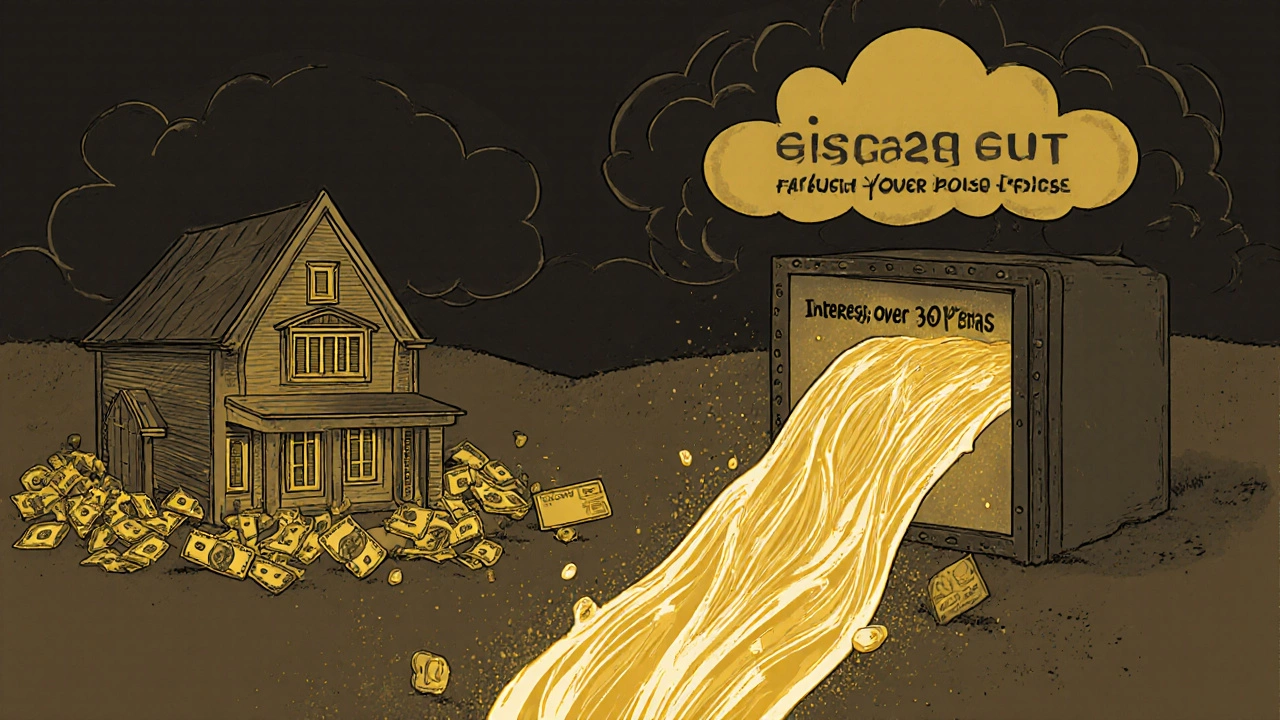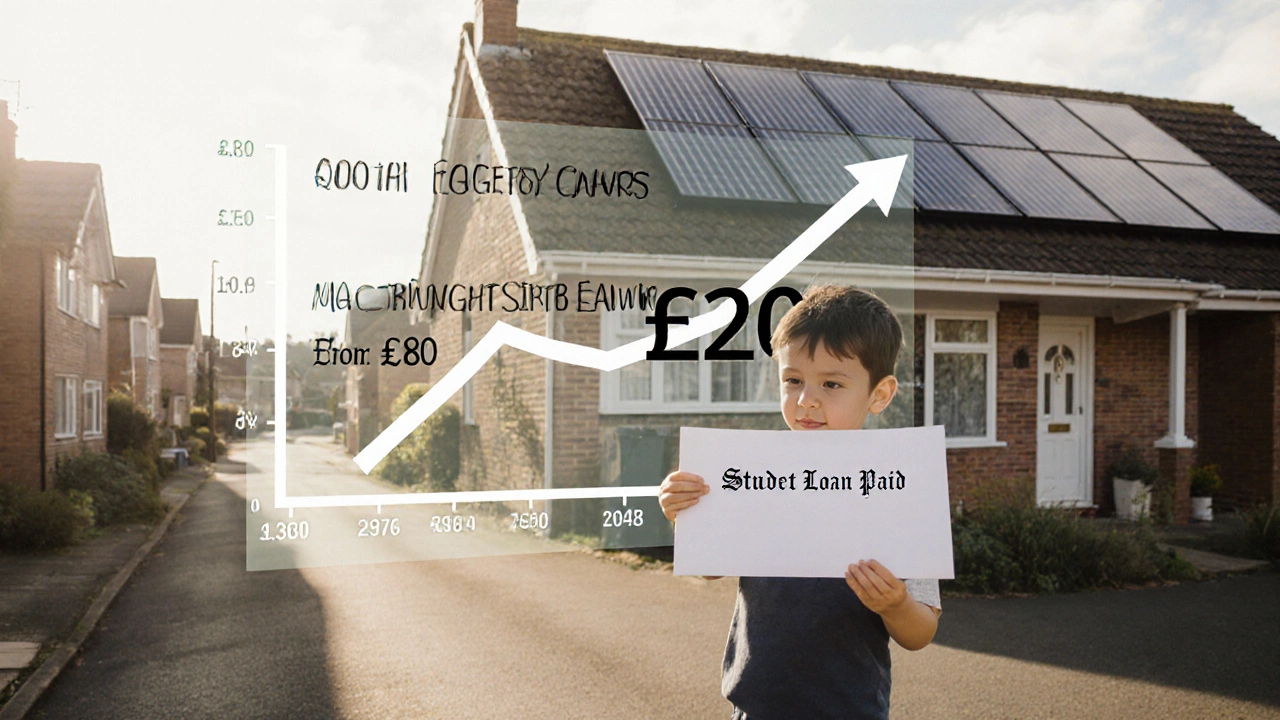Cash-Out Remortgage Calculator
Calculate Your Remortgage Cash Payout
Your Remortgage Results
Equity Analysis
Your current equity: £260,000 (based on £380,000 home value - £120,000 mortgage)
Maximum loan amount (80% LTV): £304,000
Potential cash payout: £184,000
Estimated Fees
Arrangement Fee: £1,200
Valuation Fee: £800
Other fees (legal, early repayment): £2,500
Total fees: £4,500
Financial Impact
Monthly payment increase: £180
Interest over 25 years: £148,000
Net cash received after fees: £179,500
Break-even point: 3.2 years
Risk Analysis
Equity reduction: 42% (from 68% to 26% of home value)
House price drop risk: If home value falls -17%, you could face negative equity
Recommendation: Consider only if you have a clear use for the cash
When you remortgage, you’re not just switching lenders-you’re unlocking the value you’ve built in your home. But can you actually get money back from it? The short answer: yes, but it’s not a refund. It’s a cash payout tied to your home’s equity. And how much you get depends on what you’ve paid down, what your home is worth now, and what your new lender is willing to lend.
How remortgaging puts cash in your pocket
Remortgaging means taking out a new mortgage on a property you already own. Most people do it to get a better interest rate. But a growing number are doing it to pull out cash. That cash doesn’t come from thin air. It comes from the equity you’ve built up.
Let’s say you bought a house for £250,000 ten years ago. You put down £50,000 and borrowed £200,000. Today, you’ve paid off £80,000 of the loan, so you owe £120,000. Meanwhile, your home’s value has jumped to £380,000. That means you now have £260,000 in equity-your home’s value minus what you still owe.
If you remortgage and borrow £300,000 against that £380,000 home, you’ll pay off your old £120,000 loan and walk away with £180,000 in cash. That’s not a refund. It’s a new loan secured against your home. You’re trading debt for cash, not getting money back.
Why people use remortgaging to get cash
People pull cash out for all kinds of reasons. Some use it to pay off high-interest credit card debt. Others fund home renovations, which can boost the property’s value even more. A third group uses it to cover unexpected costs like medical bills or helping family members.
In 2024, the Bank of England reported that 38% of remortgages in the UK included a cash withdrawal. The average amount pulled out was £42,000. That’s not pocket change. It’s enough to fully renovate a kitchen and bathroom, pay off all your credit cards, or even buy a second car outright.
One homeowner in Manchester remortgaged in early 2025 after her home value rose 17% in two years. She pulled out £65,000 to pay off her daughter’s student loans and install solar panels. Her monthly payments went up by £180, but her energy bills dropped by £220. That’s a net gain.
It’s not free money-here’s what you’re really trading
Getting cash from remortgaging sounds easy. But there are costs and risks you can’t ignore.
First, you’re increasing your total debt. Even if your new interest rate is lower, you’re borrowing more. That means you’ll pay more in interest over time. A £180,000 cash payout on a 30-year mortgage at 4.5% adds roughly £148,000 in interest over the life of the loan. That’s more than the cash you received.
Second, you’re reducing your equity. If house prices drop, you could end up owing more than your home is worth. That’s called negative equity. It makes it harder to sell or remortgage again.
Third, there are fees. Arrangement fees, valuation fees, legal fees, and early repayment charges from your old lender can add up to £3,000-£6,000. You need to make sure the cash you get outweighs those costs.
One woman in Bristol remortgaged in 2024 to get £50,000 for a home extension. She didn’t factor in the £4,200 in fees. By the time she sold the house two years later, the extension hadn’t added enough value to cover the extra debt and fees. She lost money.

When remortgaging for cash makes sense
It’s not a bad idea if you’re strategic. Here’s when it works:
- You have at least 20% equity in your home (some lenders require 25% or more)
- You’re using the cash for something that increases your home’s value (kitchen remodel, extension, energy upgrades)
- You’re replacing high-interest debt (credit cards at 18%+ interest) with a lower mortgage rate (3-5%)
- You plan to stay in the home long enough to recoup the fees and interest
For example, if you’re paying £400 a month on a £15,000 credit card balance at 19% interest, switching to a remortgage at 4.2% cuts your monthly payment to £75 and saves you £12,000 in interest over 10 years. That’s a smart move-if you don’t rack up new credit card debt.
What lenders look for before approving cash-out remortgages
Not everyone qualifies. Lenders aren’t just checking your income-they’re checking your home’s value and your debt-to-income ratio.
Most lenders cap the loan-to-value (LTV) ratio at 80% or 85%. That means if your home is worth £400,000, you can’t borrow more than £320,000-£340,000. If you still owe £150,000, your max cash payout is £170,000-£190,000.
You’ll also need:
- A credit score above 660 (some lenders want 700+)
- Proof of stable income (pay slips, tax returns, self-assessment)
- No recent missed payments or County Court Judgments (CCJs)
- A valuation report from the lender’s surveyor
Some lenders, like Nationwide and Halifax, offer cash-out remortgages only to existing customers. Others, like Paragon Bank and Aldermore, specialize in non-standard cases but charge higher rates.
Alternatives to pulling cash out via remortgage
Remortgaging isn’t your only option. Here are two others:
1. Equity release (for over-55s)
If you’re 55 or older and don’t want to make monthly payments, an equity release scheme lets you borrow against your home without repayments. The loan plus interest is paid back when you die or move into care. But the interest compounds over time, and you lose control of your inheritance. It’s not for everyone.
2. Personal loan
If you need £20,000 or less and have good credit, a personal loan might be cheaper. Rates start at 5.9% for 3-5 year terms. You won’t risk your home, but your monthly payments will be higher than a mortgage. And you won’t get the same tax benefits.
One couple in Leeds needed £18,000 for a new roof. They took a 5-year personal loan at 6.2%. Their monthly payment was £350. They remortgaged instead and got the same amount at 4.8%, but their payment only went up by £120. They chose remortgaging because they planned to stay in the house for 15 more years.

How to calculate if it’s worth it
Before you apply, run the numbers:
- Current home value: £X
- Current mortgage balance: £Y
- Equity: £X - £Y
- Max you can borrow (80% LTV): £X × 0.8
- Potential cash payout: (£X × 0.8) - £Y
- Total fees: £Z
- New monthly payment: Estimate with a mortgage calculator
- Compare: Is the cash payout worth the extra interest and fees?
Use the MoneySavingExpert mortgage calculator to test different scenarios. Plug in your numbers and see how much you’d pay over 10, 15, or 25 years.
What happens if you can’t repay
Remortgaging for cash turns your home into collateral. If you miss payments, the lender can repossess it. That’s not a risk you take lightly.
Before you pull out cash, ask yourself: What if I lose my job? What if interest rates rise again? What if my home value drops 10%? Can I still afford the payments?
One man in Birmingham pulled out £80,000 in 2023 to start a business. He lost the business in 2024. His mortgage payment went up 18% when his fixed rate ended. He couldn’t afford it. He lost his home.
Final checklist before you remortgage for cash
- Do I have at least 20% equity in my home?
- Am I using the cash for something that adds value or reduces debt?
- Have I compared at least 5 lenders, including my current one?
- Have I calculated the total cost over 5 years, not just monthly payments?
- Have I factored in all fees-valuation, legal, arrangement, early repayment charges?
- What’s my worst-case scenario if income drops or interest rises?
- Have I spoken to a whole-of-market mortgage broker?
If you answered yes to all of those, you’re ready to move forward. If not, pause. Get advice. Don’t rush.
Can you get money back from remortgaging without borrowing more?
No. You can’t get cash back just by switching lenders. You have to borrow more than you currently owe. The extra amount you borrow is what you get as cash. If you just switch to a lower rate without increasing your loan, you won’t receive any money.
How much cash can I get from remortgaging?
It depends on your home’s value and how much you still owe. Most lenders let you borrow up to 80-85% of your home’s value. So if your home is worth £400,000 and you owe £150,000, you could potentially get up to £170,000 in cash (£320,000 max loan minus £150,000 owed). But you’ll need good credit and income to qualify.
Is remortgaging for cash a good idea?
It can be-if you use the money wisely. Paying off high-interest debt or making home improvements that increase your property’s value are smart uses. But using it for holidays, new cars, or lifestyle spending is risky. You’re turning unsecured debt into secured debt, putting your home on the line.
Do I need a good credit score to remortgage for cash?
Yes. Most lenders require a credit score of at least 660. If your score is below that, you’ll either be denied or offered a much higher interest rate. Improving your score by paying down credit cards and checking for errors can make a big difference.
What’s the difference between remortgaging and equity release?
Remortgaging requires monthly payments and is available to anyone. Equity release is only for people over 55 and doesn’t require repayments-instead, the loan is repaid when you die or move into care. Equity release costs more over time because interest compounds, and you give up part of your home’s future value.
